Books
Books
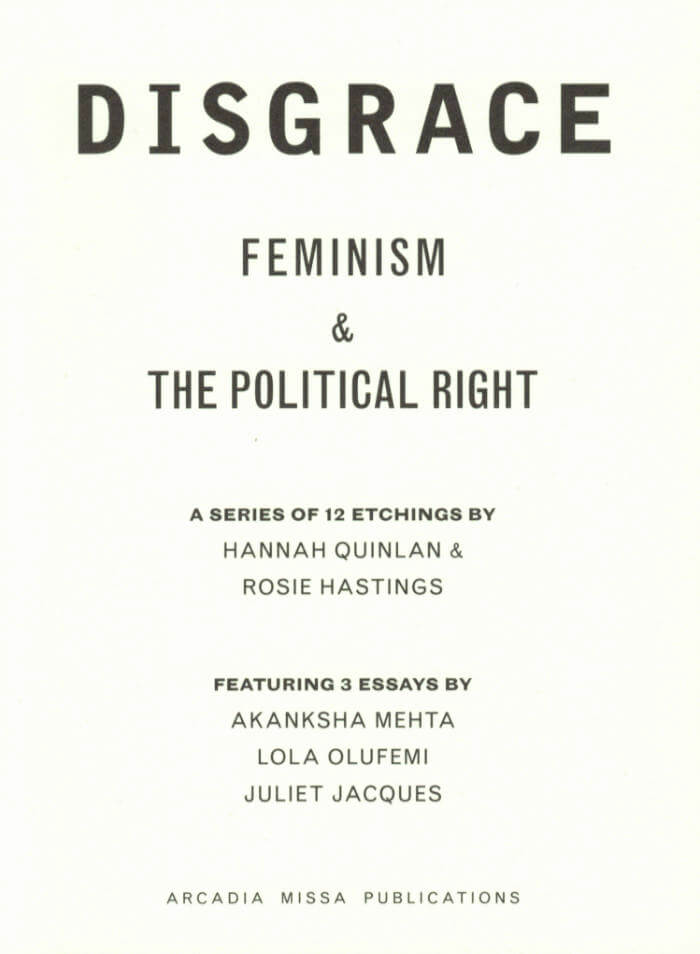
Disgrace: Feminism And The Political Right
Rosie Hastings, Hannah Quinlan
DISGRACE: Feminism and the Political Right explores the history of conservative feminism in the UK from the Edwardian period to today. Expanding on Hannah Quinlan and Rosie Hastings’ research for their eponymous exhibition, the book aims to provide contextual information for the viewer, both as a resource on the history of feminism on the political right and to provide a deeper historical and political insight into the works within the exhibition.
The book centres around a timeline created by 12 etchings, with three essays covering what the artists have identified as three significant time periods, mapping the connections between the various historical manifestations of conservative feminism that lead to the current moment. An essay by Akanksha Mehta, a lecturer in Gender, Sexuality, and Cultural Studies and the co-director of the Centre for Feminist Research at Goldsmiths, considers the nature of the women’s suffrage movement, focusing on the relationship between the suffragettes and eugenics discourse. A polemical text by Lola Olufemi, a black feminist writer and organiser with the London Feminist Library, questions the women’s liberation movement and ‘sex wars’ of the mid 20th century. In the final essay – alongside etchings exploring ‘free-market feminism’, Theresa May’s ‘Women2Win’ campaign and the proliferation of transphobic rhetoric – writer, filmmaker and journalist Juliet Jacques uses Caryl Churchill’s innovative 1982 play ‘Top Girls’ to trace the trajectory of women in power, from Thatcher into the future of feminism.
FEATURING 3 ESSAYS BY:
Akanksha Mehta
Lola Olufemi
Juliet Jacques
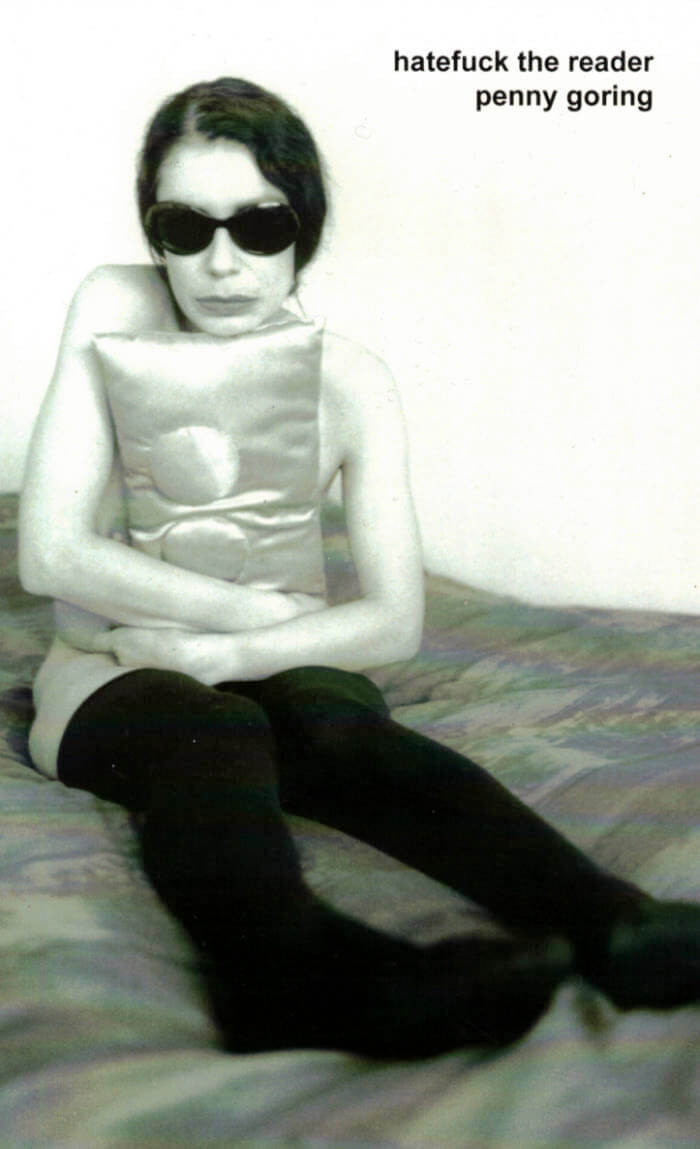
hatefuck the reader
“This book is about damage and violence, about the ramifications of channeling intensity at all costs. It is a text that is utterly compelling, that you tumble into and cannot escape from. I fucking loved it.” — Dodie Bellamy

Fail Like Fire
Fail Like Fire is a carefully selected collection of twenty poems, written over the past HOWEVER MANY years, from Penny Goring’s intensely personal poetry archive.

All Us Girls Have Been Dead for So Long
Kathy Acker’s final published text, Eurydice in the Underworld, harnesses the Greek mythology of the heroic trip to hell; refocusing the story’s centre away from the male hero and onto the dead girl, who has been murdered by a snake.
Katabasis refers both to a journey into the underworld, and a trip to the coast. In times of climate crisis, hell – the realm of the dead, the scorching, the boiling, the rotting – is also situated at the sea, as waters heat, melt and rise.
First performed in 2019 at the ICA, London, All Us Girls Have Been Dead for So Long was a low-fi musical extravaganza flowing between beach and underworld, animating the animal, alien, and abject actors in our current climate apocalypse – most notably Ecco the Dolphin, who has lost their pod and must (like Eurydice, Orpheus and so on) travel deep beneath both time and space to rescue their missing and possibly dead kin.
Only a fool will now attempt to stop us girls. To halt our ecstatic singing.
A play in three acts by Linda Stupart and Carl Gent with a foreword by Isabel Waidner.
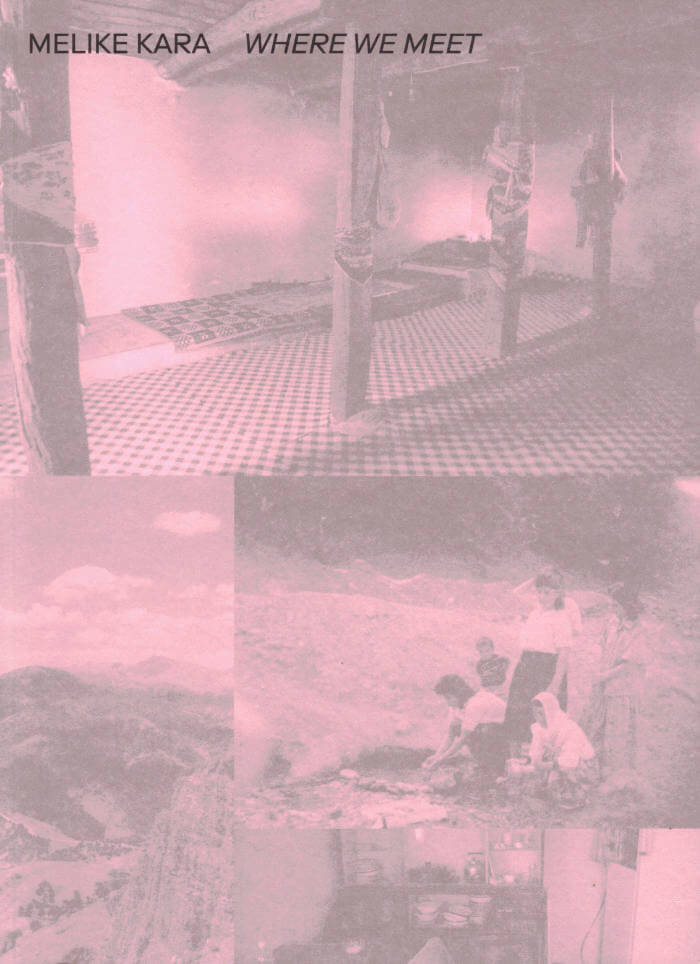
Verlag der Buchhandlung Walther König
Where We Meet
This first publication of the artist Melike Kara, emphasises her work of the last two years and thus on a specific body of work that represents a shift in the artist’s methodology.
Her paintings have undergone a change, as they are less figurative and more abstract (although Kara’s abstractions reveal forms here and there).
Some of these forms are reminiscent of limbs, hybrids between bodies and dissolution. Her focus has also changed in terms of subject matter.
It is now less a matter of consciousness, and more about identity and questions of origin. She thus complements, or rather expands, the presentation of these paintings in exhibitions with site-specific installations.
Published after the exhibition, ‘Melike Kara: Where We Meet’ at Jan Kaps, Cologne (4 June – 22 August 2020).
With contributions from Jana Baumann, AnneClaire Schmitz & Fabian Schöneich.

Twenty Terrifying Tales from our Techno Feudal Tomorrow
William Kherbek’s Twenty Tales from our Technofeudal Tomorrow are of course twenty tales from our technofeudal today. From the software company to the art gallery to the prison to the nature park, here is our scary, scary world as seen through the Kherbekian filter: colors pushed to full saturation, soundtrack ramped up to eleven, video played at 1.1x speed. Luckily, the terror of true realism is laced with wild insights, and the acerbic critique is mercifully cut with Kherbek’s signature raucous hilarity.
"Read this book for its political sagacity and wit, but also for its linguistic extravagance, its jubilant play on every word you thought you knew — down to the last punctuation mark. It’s the kind of funny that makes you smack yourself on the forehead. (But as always, as one character reminds, “keep one hand free for rose.”) We can only hope that some CEO does not pick this book up and take it as an instruction manual." – Elvia Wilk, author of Oval
"Kherbek’s ruthless, dystopian future bears an uncanny resemblance to present-day office politics. Twenty Terrifying Tales from Our Technofeudal Tomorrow is a book that, in true Swiftian style, is written “to vex the world rather than divert it.” – Susan Finlay, author of My Other Spruce and Maple Self

Ultralife
Big data (n) is high-volume, high-velocity and/or high-variety information assets that demand cost-effective, innovative forms of information processing that enable enhanced insight, decision making, and process automation.

Ecology of Secrets
Deep cover, a new identity, a beached whale… a man with dreadlock implants using the alias Spanx is rooting the crusty enviro-activists out of their squats.
An ambitious young detective is tasked with creating a new kind of surveillance project to contain domestic extremists: become a domestic extremist. Under the pretence of forming a cell of environmental activists, Spanx and company go deep into the belly of the beast. Along the way, they take over the identities of dead children, the carcasses of cetaceans, and Wordsworth’s cottage in Grasmere. But then Spanx falls for a flower child called Psyche, takes on one identity too many and things really get complicated.
Arcadia Missa Publications, London, 2013; with additional editing by Felix L. Petty.
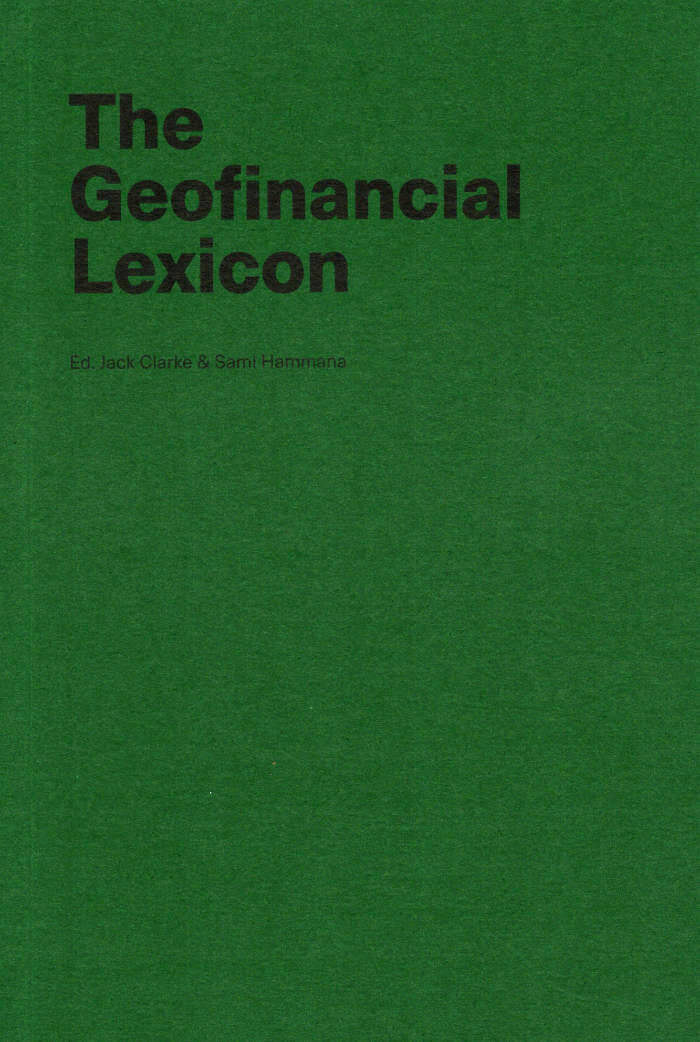
The Geofinancial Lexicon
The concept of a Geofinancial Lexicon emerged in 2016 as a curated subset of the then-canonical financial lexicon compiled and maintained by the Financial Times. The experiment set out to demarcate the possible relationships between the Earth, finance and the anthropocene through the complicitous vocabulary of financial advisors and traders – the Bulls, Bears, Doves and Hawks of ‘high-finance’ and economic policymaking.
This edition, rewritten and recompiled for general release, aims to open this experiment out to the wider-world and provide a generative platform for future investigations, conceptualisations, experiments, languages, actions and collaboration.

Entropia Vol. 1 & 2
Entropia (vol. I & II) – written by William Kherbek and edited in collaboration with Jack Clarke – is a publication which seeks to recount and re-examine a decade of artistic curation, production, and critique between London, Berlin, and other urban art centres from 2010 to 2020.
Comprised of two volumes, this publication contains a compendium of over one hundred reviews and interviews with luminaries of contemporary art (Vol I), as well as a speculative attempt to create a newly generated algorithmic art(ificial) critic (Vol II). Together they serve to document, excoriate, and theorise an art world which is simultaneously hegemonic and precarious, complicit and constructive, driven by values, yet fed by extraction, all filtered through Kherbek’s precise, aphoristic, acerbic, lens.
The publications include contextual contributions from both Josie Thaddeus-Johns, writer for the New York Times, The Financial Times, Frieze; and Rozsa Farkas, director of London-based gallery Arcadia Missa.

Museum of Modern Art, New York
Signals: How Video Transformed the World
Since its debut as a consumer medium in the 1960s, video has shaped our opinions, our politics and our societies. On our phones and computer screens, walls and streets, it defines new spaces and experiences—spreading memes, lies, fervor, fact and fiction. In other words, video has transformed the world.
Featuring works from the collection of the Museum of Modern Art, New York, this illuminating exhibition catalog—MoMA's first major publication on video art in nearly 30 years—explores the ways in which artists have both championed and questioned video's promise, some hoping to create new networks of communication, democratic engagement and public participation, others protesting commercial and state control over information, vision and truth itself.
Lavishly illustrated essays by esteemed scholars and artists—including Ina Blom, Aria Dean, David Joselit, Pamela M. Lee, Glenn Ligon and Ravi Sundaram—highlight video's widely varied formats, contexts and global reach. Signals is a manual for understanding the present, an era in which video has pervaded all aspects of life.

Verlag der Buchhandlung Walther König
Joan Jonas: Moving Off the Land
A multimedia meditation on the many meanings of the ocean across history.
This volume closely follows the development of Joan Jonas' (born 1936) multiformat project Moving off the Land. The artist's most recent body of work, it encompasses three years of research into the significance of the ocean throughout history, and features sculptures, drawings, sound and new video productions. Jonas combines poetry and prose by writers such as Emily Dickinson and Herman Melville with texts by Rachel Carson and Sy Montgomery, and with moving images filmed in aquariums and in Jamaica, where algae bloom and over-fishing pose urgent threats to the ecosystem. The monograph includes the complete script for the performance along with annotations, images of Jonas' live performance, and a complete chronology with documentation of the performance's history.

Kissing Other People or the House of Fame
A book in two halves, Kissing Other People or the House of Fame opens with a sequence of poems that roam the grotty, sublime streets: patting rats, reading pamphlets, enduring labour, acquiring falafel, waving to friends. Then the book flips on a seam and invokes Chaucer as an unlikely guide through a series of dream-blocks, each autonomous yet resonant with attachments and perversions as they come and go, repeat and echo. The book is as staunch as it is warm - one arm extended in a hug and the other cupped over the mouth to shield a secret (weapon).
Kay Gabriel is a poet and essayist. With Andrea Abi-Karam, she co-edited We Want It All: An Anthology of Radical Trans Poetics (Nightboat, 2020). She's the author of A Queen in Bucks County (Nightboat Books, 2022).

Bad Gays: A Homosexual History
An unconventional history of homosexuality.
We all remember Oscar Wilde, but who speaks for Bosie? What about those 'bad gays' whose unexemplary lives reveal more than we might expect? Many popular histories seek to establish homosexual heroes, pioneers, and martyrs but, as Huw Lemmey and Ben Miller argue, the past is filled with queer people whose sexualities and dastardly deeds have been overlooked despite their being informative and instructive.
Based on the hugely popular podcast series of the same name, Bad Gays asks what we can learn about LGBTQ+ history, sexuality and identity through its villains, failures, and baddies. With characters such as the Emperor Hadrian, anthropologist Margaret Mead and notorious gangster Ronnie Kray, the authors tell the story of how the figure of the white gay man was born, and how he failed. They examine a cast of kings, fascist thugs, artists and debauched bon viveurs. Imperial-era figures Lawrence of Arabia and Roger Casement get a look-in, as do FBI boss J. Edgar Hoover, lawyer Roy Cohn, and architect Philip Johnson.
Together these amazing life stories expand and challenge mainstream assumptions about sexual identity: showing that homosexuality itself was an idea that emerged in the nineteenth century, one central to major historical events.
Huw Lemmey is a novelist, artist and critic living in Barcelona. He is the author of three novels: Unknown Language, Red Tory, and Chubz. He has written for the Guardian, Frieze, Tribune, the Architectural Review, New Humanist, the White Review, and L'Uomo Vogue, among others.
Ben Miller is a writer and researcher living in Berlin, where he is currently a Doctoral Fellow at the Graduate School of Global Intellectual History at the Freie Universität. He has written for the New York Times, Literary Hub, Los Angeles Review of Books, Tin House, and Radical History Review, and is the author of The New Queer Photography. Since 2018 he has been a member of the board of directors of the Schwules Museum, one of the world's largest independent queer museums and archives.
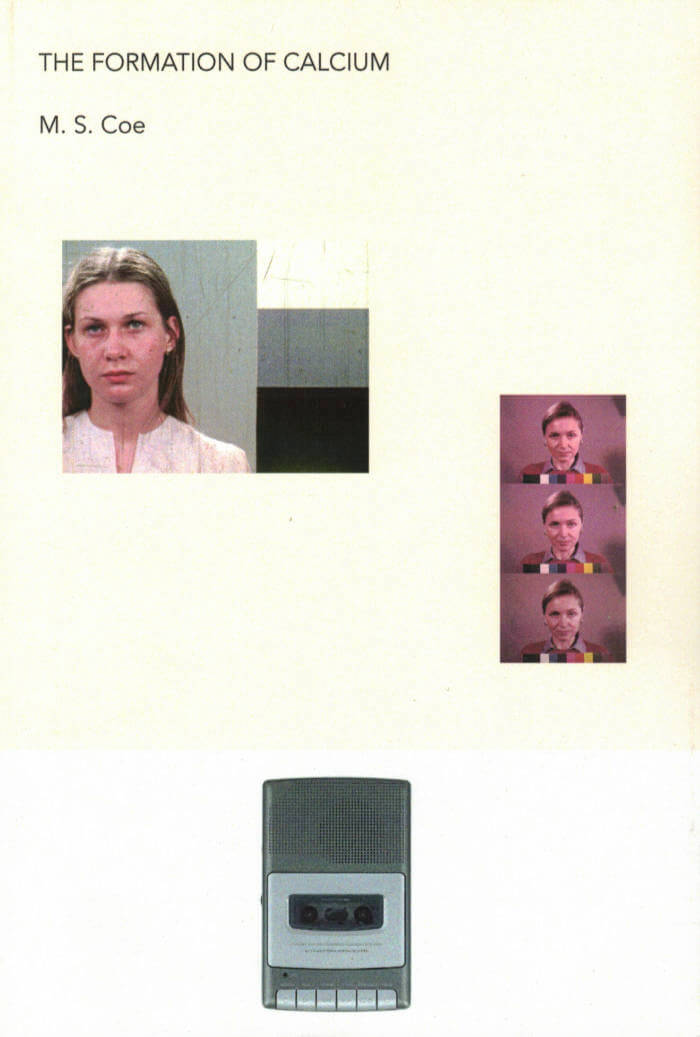
The Formation of Calcium
A horror story of one woman's awful reinvention, M. S. Coe's The Formation of Calcium is disturbingly funny and completely unexpected.
Middle-aged Mary Ellen Washie has finally freed herself of her stultified past life in western New York state and moved to Florida. With the husband she's grown to hate firmly in her rearview mirror, and all ties to her family cut off, she changes her name, bleaches her hair, and befriends Natalie, a seemingly kind, martini-loving woman whom she promptly begins to manipulate. As her machinations propel her beyond the brink of who she used to be, Mary Ellen seeks to unburden herself—but not one to sit down with pen and paper, she narrates the events of her new life into a cassette tape recorder, giving each tape an innocuous name to keep the curious away. A riveting account of one woman's awful reinvention, M. S. Coe's new novel is disturbingly funny and completely unexpected. With elements of pulp noir and confessional literature, The Formation of Calcium depicts the bland misery of modern American life as one woman seeks her own ill-fated transformation.
Born in Las Vegas, Nevada, M. S. Coe is an American writer living in Guadalajara, Mexico. After she graduated with an MFA in creative writing from Cornell University, Clash Books published her first novel, New Veronia, in 2019. Coe's stories have appeared in The Antioch Review, Cosmonauts Avenue, Electric Literature, Nashville Review, Waxwing, and elsewhere. She has held residencies from the Herbert Hoover National Historic Site, Petrified Forest National Park, and Ora Lerman Trust.

The Close Chaplet
Long out of print, The Close Chaplet is Laura Riding's first book, originally published in 1926. Riding deliberately ceased writing poems after 1940, when she came to see poetry as irrevocably flawed as a means of expression. These poems demonstrate Riding's early desire to depart from the close and well-tilled ground of traditional lyric poetry. According to her biographer, Elizabeth Friedman, many of the poems for THE CLOSE CHAPLET were brought in typescript from New York, a few were added in Egypt, and the entire text was carefully edited by Robert Graves.
In his introduction, Mark Jacobs writes that Riding was identifying herself with the pre-moment, the 'what-was-there' before Creation. How did the world, the universe, come to exist, why does it exist, why does it die, why do we? From these questions, Riding begins to develop a theory about the role of women as the origin of all human beings, the only animals with written language. This edition also includes Riding's essay A Prophecy or a Plea, a statement of her poetics initially published in 1926.
Laura Riding was a poet, novelist, short-story writer, essayist, and publisher. While primarily known for the critical works that she co-authored with Robert Graves — A Pamphlet Against Anthologies and A Survey of Modernist Poetry — Riding also left behind an incredibly powerful body of poetry and prose works that, regrettably, remain little read today. These include THE CLOSE CHAPLET (Ugly Duckling Press, 2020), EXPERTS ARE PUZZLED (Ugly Duckling Presse, 2018), CONVALESCENT CONVERSATIONS (Ugly Duckling Presse, 2018), The Lives of Wives, and The Progress of Stories. Famously rejecting poetry early in her career, she spent the last decades of her life co-writing a theoretical work on linguistics, Rational Meaning, with her husband Schuyler Jackson. She was awarded the Bollingen Prize in 1991, the very same year she died.

DEARS No. 5 ever:over
Robert Steinberger, Delphine Chapuis Schmitz and 1 more
DEARS is a print magazine for transversal writing practices at the crossroads of art, poetry and experimental writing. It brings together authors and writers from different backgrounds and constitutes a dedicated platform for texts escaping the usual genres and disciplinary boundaries.
DEARS promotes the exploration of new forms of language as a way to foster new forms of living together, and emphasizes the growing relevance of trans- versal writing practices in this respect.
DEARS no. 5 / Summer 2023 / ever.over
With texts by Diaty Diallo, Douglas Keaney, Dzifa Benson, Sevinç Çalhanoğlu, Jana Vanecek, and an epigraph by Trinh T. Minh-ha.

The Swarm
A shape-shifting, metaphysical thriller where sensorial, sexual, and revolutionary impulses are aligned for the purpose for anarcho-transcendent-communal escape, The Swarm circles around a sundry of anomalous and dead beings who plot their way out of Hungarian fascist rule in the thermal baths of Budapest.
Based in Berlin, Dalia Neis is a writer, filmmaker, and lyricist and vocalist for Dali Muru & The Polyphonic Swarm. Previous publications include Zephyrian Spools: An Essay, a Wind (Knives, Forks & Spoons), and Hercules Road (MA Bibliothèque).

Manimal Woe
Manimal Woe maps the intersection between history and family as few books have. Through poetry, prose, and primary sources, Howe invites us on a journey with the spirit of her father, Civil Rights lawyer and professor Mark DeWolfe Howe, who died suddenly in 1967. The past, both personal and historical, is utterly present, yet just out of reach. From her ancestors' dark legacy as slave traders, to her father's work during the Civil Rights era, to her own interracial marriage and family, Fanny Howe delves deep into the heart of the mysterious and the mystical, and emerges with the questions that so rarely find their way to us.

Return
Through the recurrence of memory, myth, and grief, 回 / Return captures the elusory language of sorrow and solitude that binds Taiwanese diasporic experience.
Rooted in the classical tradition of the Chinese "reversible" poem, 回 / Return is engaged in the act of looking back—toward an imagined homeland and a childhood of suburban longing, through migratory passages, departures, and etymologies, and into the various holes and voids that appear in the telling and retelling of history. The poems ask: What is feeling? What is melancholy? Can language translate either?
A former Margins Fellow at the Asian American Writers' Workshop and the recipient of a Pushcart Prize, Emily Lee Luan is the author of I Watch the Boughs, selected by Gabrielle Calvocoressi for a Poetry Society of America Chapbook Fellowship. Her work has appeared in The Best American Poetry 2021, Best New Poets 2019, American Poetry Review, and elsewhere. She holds an MFA from Rutgers University-Newark.

New Forms of Art and Contagious Mental Illness
Over the years 1919–20, the celebrated medical scientist and doctor Carl Julius Salomonsen began giving public lectures and publishing pamphlets regarding a new “epidemic” that had begun to affect the European populace: the increasing ubiquity of modernist art.
In a 1919 pamphlet titled New Forms of Art and Contagious Mental Illness, he wrote: “We stand, at this moment, before a movement in art which is psychopathic in character, and whose victorious journey through all countries is probably caused by the same spiritual disease that gave the older, religious spiritual epidemic such a powerful spread.” This pamphlet and the accompanying talks were countered by a retaliatory pamphlet published by members of Grønningen, a Copenhagen modernist painters group, to which Salomonsen responded with a further pamphlet.
Translated into English for the first time by literary theorist Andrew Hodgson, the entire altercation is gathered in this book, documenting one of the earliest rejections of modernist art.
Edited & Translated by Andrew Hodgson.

Forlaget Emancipa(t/ss)ionsfrugten
The Order of Release
The Order of Release gathers and comments upon a number of press releases written by artists. The format of the press release came to the author’s attention through her work at an exhibition space where she was writing such texts. In The Order of Release, Brandt explores different ways that artists have used or appropriated the press release as a proper medium or as an active part of the exhibition itself.
A. E. Brandt is based in Paris. Her recent work deals with the circulation and profusion of writing.

Your Love Is Not Good
At an otherwise forgettable party in Los Angeles, a queer Korean American painter spots a woman who instantly controls the room: gorgeous and distant and utterly white, the centre of everyone’s attention. Haunted into adulthood by her Korean father’s abandonment of his family, as well as the spectre of her beguiling, abusive white mother, the painter finds herself caught in a perfect trap. She wants Hanne, or wants to be her, or to sully her, or destroy her, or consume her, or some confusion of all the above. Since she’s an artist, she will use art to get closer to Hanne, beginning a series of paintings with her new muse as model. As for Hanne, what does she want? Her whiteness seems sometimes as cruel as a new sheet of paper.
When the paintings of Hanne become a hit, resulting in the artist’s first sold-out show, she resolves to bring her new muse with her to Berlin, to continue their work, and her seduction. But, just when the painter is on the verge of her long sought-after breakthrough, a petition started by a Black performance artist begins making the rounds in the art community, calling for the boycott of major museums and art galleries for their imperialist and racist practices.
Torn between her desire to support the petition, to be a success, and to possess Hanne, the painter and her reality become more unstable and disorienting, unwilling to cut loose any one of her warring ambitions, yet unable to accommodate them all. Is it any wonder so many artists self-destruct so spectacularly? Is it perhaps just a bit exciting to think she could too?
Your Love Is Not Good stuffs queer explosive into the cracks between identity and aspiration, between desire and art, and revels in the raining debris.
Johanna Hedva is a Korean American writer, artist, and
musician who was raised in Los Angeles by a family of witches, and now lives in LA and Berlin. Hedva is the author of the essay 'Sick Woman Theory', originally published in 2016, which has now been translated into ten languages. Hedva is also the author of the novel On Hell, which was one of Dennis Cooper's favourite books of 2018, and the nonfiction collection Minerva the Miscarriage of the Brain. Their albums are The Sun and the Moon and Black Moon Lilith in Pisces in the 4th House.

Being a Chair. Essays on Choreographic Poetry
Imagine words approaching a dance eyes closed or sleepwalking, words adrift beyond what can be envisioned beforehand, prompting writer and reader alike into a zone where time multiplies, where bodies grow footnotes and paper skin, savour the taste of language, attune their ears to the wavelength of blue. In a string of brief essays on her practice of writing choreographic poetry and scores, Janne-Camilla Lyster offers reflections on time, memory and the senses, on translation, punctuation and rhythm, on mistakes and crevasses, on the impossible and yet other things. What does it take to enter another form of existence, say, a chair?
Janne-Camilla Lyster is a writer, dancer and choreographer. She has published poetry, novels, essays and plays.